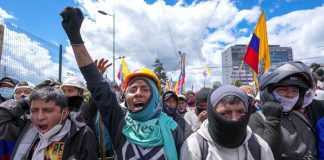Last month Italian prime minister Silvio Berlusconi told people how they could stave off financial disaster–buy shares in two national energy companies–yet by the end of that days trading they had lost 7 per cent and 8 per cent in value. It was because of this stupidity, and for many other reasons, that Italy is engulfed in a wave of protests.
The reality for most people, as revealed in a recently survey by the FIOM engineering union, is an average take-home pay of $2000 a month.
In late October up to a million students, teachers, lecturers, school students and their supporters demonstrated through Rome, as parliament approved laws introduced by Silvio Berlusconi’s government to slash education funding and to axe thousands of teaching posts. Over 90 per cent of the country’s schools were shut.
It was the culmination of a one-day strike by teachers and other school workers. College and high school occupations are continuing across Italy. The head of the main union federation, the CGIL, joined the Rome protest. Demands are growing for a general strike.
Fifty thousand marched through Turin accompanied by the city theatre’s orchestra. In Milan students demonstrated outside the stock exchange shouting that they should not have to pay for the economic crisis. In Florence students blocked rail lines, and in Naples they blocked the city’s main square.
Given all this activity the leader of Rifondazione Comunista, Paolo Ferrero, said: “The retreat is over.”
For six long months the party has been locked in an internal battle between a narrow unstable majority and a large united minority–with front-page articles in the party’s daily Liberazione in which leaders attack each other.
There is a growing urgency for the left to stop squabbling, because the economic crisis has only started to hit Italy in the last few weeks. Underlying the big demonstrations are a demand for unity–there are currently four Communist Parties, with none of them represented in parliament.
A FIOM leader, Giorgio Cremaschi, hit the nail on the head, when he said, “This demonstration shows that people are willing to fight. The problem lies in the headquarters of left wing parties and trade unions.”
By Tom Behan and Chris Bambery
Socialist Worker UK





